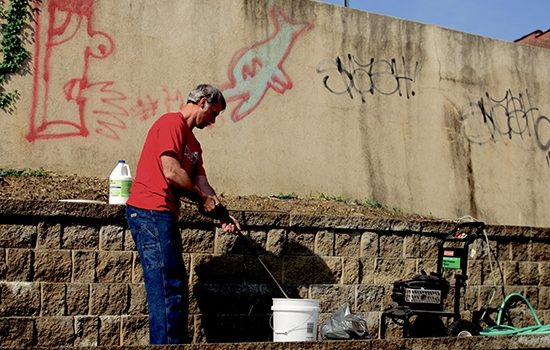The sanctuary in First Baptist Church of Jefferson City, Mo., will sit mostly quiet and empty on Sunday, April 26 —- and Senior Pastor Doyle Sager grins widely at the thought.
The church will not shut down, nor will leaders cancel services. Instead, church members will spend the day in the community to paint, clean and pick up trash. This year marks the third annual “Mission JC,” a day of volunteering as worship.
After a short worship service on the nearby Missouri Capitol lawn, volunteers will work on 54 projects, explained Melissa Hatfield, associate pastor of youth/missions and a coordinator for the project.
“We are in the city for the city,” she said. “God has placed us at the heart of Jefferson City in the historic downtown. How can we remind ourselves that God has called us to be flesh and move into the neighborhood just as Christ did?”
At the start of last year’s effort, Sager shared a story he had recently heard. After someone mentioned First Baptist at a non-religious meeting in town, someone remarked, “Oh, that’s the church that actually does something.”
Sager believes Mission JC embodies the church’s efforts to do something in the community.
Volunteering as worship
“Serve Sunday” will open opportunities for community service for members of Chandler Baptist Church in Liberty, Mo., on April 12. Pastor Sean Taylor views the effort as worship, not cancellation of worship.
“Tradition has established our current service,” Taylor explained. “Singing, spoken messages, passing plates, etc. To change this can feel like we are ‘canceling worship.’ I have heard that exact phrase. But really we are changing traditions to worship God in another way.”
Pointing to Romans 12:1, Taylor noted that worship is defined as offering our “bodies as a living sacrifice, holy and pleasing to God.
“The Scripture does not give us a Sunday worship outline —- it doesn’t even call for Sunday worship,” the pastor added.
“So we do not cancel worship, we seek to please God. We seek to worship him by service. It is simply changing the form of our worship. That is not to say our normal routine is wrong either. Our worship tradition is very valuable. Serve Sunday acts as a reminder that our praise begins inside and moves outside to love our neighbor.”
Hatfield holds a similar perspective. “The worship that God delights in, the worship that gives off a sweet aroma is a posture of daily living in adoration of God and in humble service to our fellow man,” she said.
“Whether this kind of God-centered worship happens in a house of worship or in a creek picking up trash or in a local laundromat visiting with a new friend, it is pleasing to God.
“Obviously, we still value highly the gathering of the body of Christ to encourage and equip the saints. But we need to be reminded that true worship happens each day as we live as kingdom people in our community, our workplaces and our homes. Mission JC is a powerful reminder of this,” Hatfield added.
“The question of community service or practice of mission as worship…certainly is a conversation that is happening with some frequency,” noted Heather Entrekin, Des Peres associate professor of congregational health and director of the Doctor of Ministry program at Central Baptist Theological Seminary.
The conversation is taking place among Central doctoral students as well as churches, such as a traditional congregation that changed its schedule to allow “food pantry service as worship.”
“Moving worship from pews to soup kitchens is not a simple equation of equivalents,” she added. “But it creates untold possibilities for deepening understanding and expression of worship that includes sacrament, pastoral care and the risk of becoming new creations in Christ.”
Growth of service Sundays
Mission JC started in 2012 after a team at First Baptist began “dreaming up ways that we could encourage our church to be outward-focused, to be neighbor-focused,” Hatfield said.
For the first Mission JC day in 2013, nearly 300 people volunteered with 24 projects. The next year, nearly 450 people from three churches worked on 42 projects. First Presbyterian Church and Familia Cristiana (a Hispanic congregation that meets at First Baptist) joined the effort.
This year, two more churches —- First United Methodist Church and Central United Church of Christ —- will help.
Although only First Baptist and Familia Cristiana will cancel normal worship services, leaders of the other three churches are encouraging members to participate and choose how they will spend the morning.
This year another Baptist church in Jefferson City —- Southridge —- joined the movement by replacing worship services on Palm Sunday with a morning of community service. They also called the effort “Mission JC” as they celebrated Jesus’ triumphant arrival in the streets of Jerusalem by heading to the streets of Missouri’s capital and serving their neighbors.
Similar Sunday mornings of community service are practiced by Baptist churches from South Carolina to Iowa, from Ohio to Texas. Bethany Baptist Church in Moline, Ill., calls its effort “Blue Jean Sunday.”
Chandler started its annual Service Sunday in 2013. Projects range from quilting for inner-city preschools to baking cookies for emergency responders to making home repairs. Taylor sees the Sunday as a way to live out Jesus’ teaching in the Sermon on the Mount to “not keep the light under a bowl,” he said.
“Generally we gather to praise and then pour out into the community,” he added. “But this routine can become a rut —- even a bowl —- where the church believes their arrival to praise is the mission. So once in a while we break our routine to remind the church of our true mission [and] to remind the community how Christ has called us to love.”
Brian Kaylor is a freelance writer based in Jefferson City, Mo.



